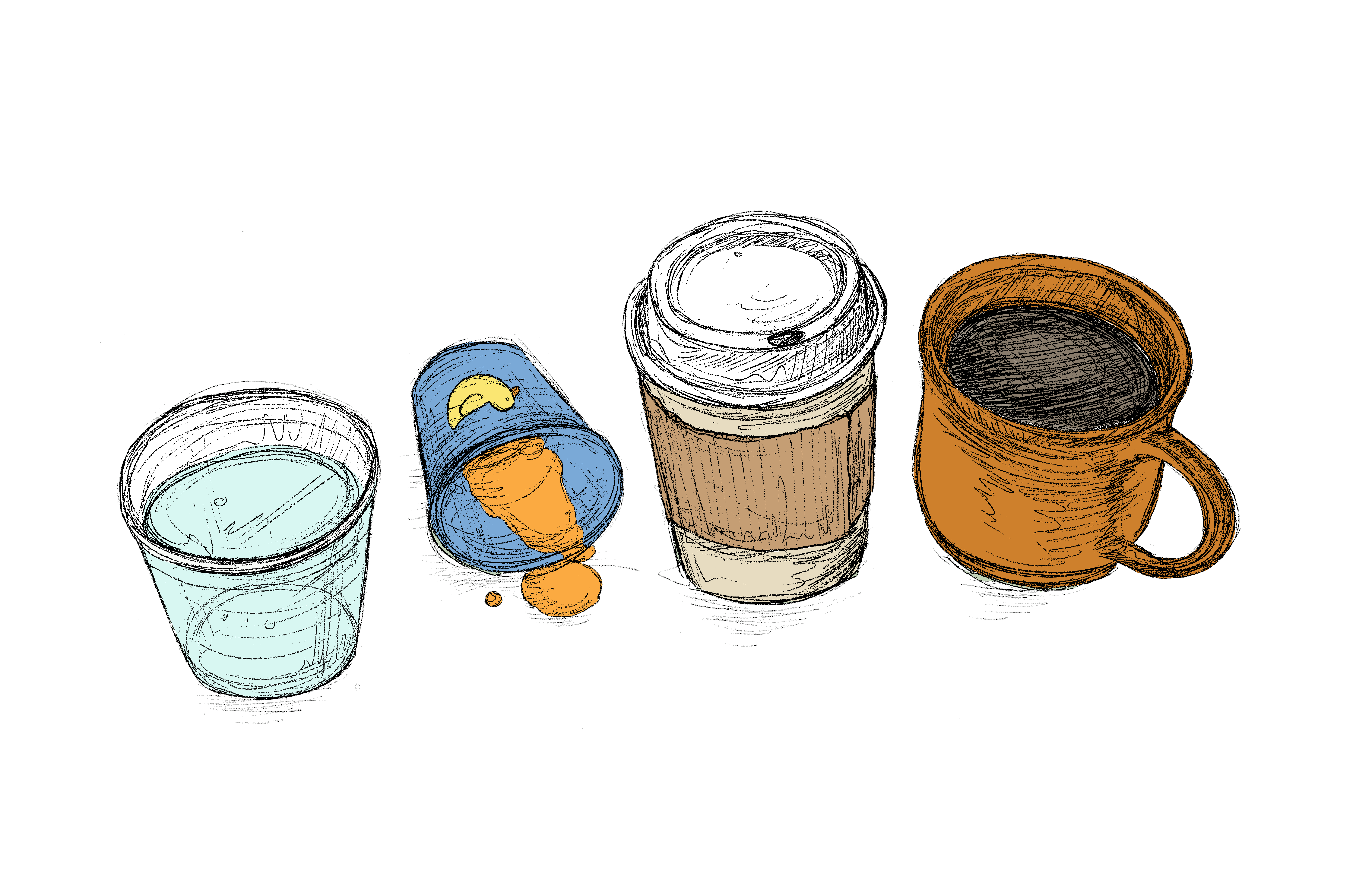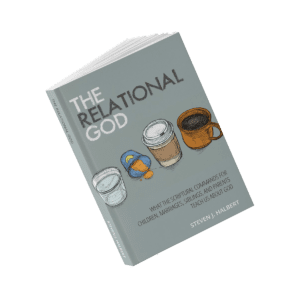My plane is just taking off from Israel. I traveled to Europe for work and decided to spend the weekend in Jerusalem. After just 36 hours in the Holy Land, I leave internally conflicted over the power of evil and hatred, as well as the sheer otherness of our faith.
An Uneasy Beginning
I arrived at my hotel in Jerusalem at 2 AM on Saturday morning. The airport to Jerusalem is about a 45 minute to 1 hour trip. I shared the journey from the airport into downtown Jerusalem in a shuttle with 12 other people. As we all crammed into the shuttle, I was already a bit paranoid. The only things we ever see on the news and in the media about this area are bad. What if people getting out of the shuttle tried to steal my bags? Or what if the shuttle wasn’t really a shuttle? What if it kidnapped naïve tourists and held them hostage!
It didn’t help that the first stop we made was to drop 2 of the passengers at one of the Palestinian borders. There was a big, red government sign indicating that this was the road to “Area A”. Strictly forbidden for Israeli citizens and very dangerous. It was dark, so I couldn’t see much else; except, as the two women exited the shuttle, the headlights illuminated the paw of a feral dog clawing at the Israeli / Palestinian barriers.

This was obviously an area of extreme poverty. And it was the first time on my trip that I felt alarmed, unsafe. I didn’t know this driver or this shuttle company. I also didn’t know the area. So what did I do? Like any good American, I pulled out my cell phone to make sure we were heading in the general direction of my hotel in Jerusalem. Like any human, I attempted to gain a little control.
The Tours in and around Jerusalem
I made it to my hotel without any other incident and went to bed. I woke up that Saturday for a tour of the “Old City” of Jerusalem and the Dead Sea. My wife, Michelle, was very wary of me going on this trip. To set her mind at ease, I agreed that I would not venture too far on my own (as I normally do in these sorts of situations). Instead, I agreed to use a tour company. The tour on Saturday was great, so I had high expectations for my Sunday tour to from Jerusalem to Bethlehem. My tour of Bethlehem was supposed to conclude with a trip to the airport, so I could catch my afternoon flight back to Europe.
Bethlehem is in Palestine, and there were only two of us taking the tour that day. The bus driver dropped us at a non-descript location and asked us to get into a smaller car with a Palestinian license plate so that we could get into Palestine. He told us to leave our bags on the bus. I decided to leave my luggage but not my backpack.
When we made the transfer, we had just passed one of the warning signs pictured above. Furthermore, the tour group had not communicated this transfer at the outset. Again, I felt alarmed, unsafe. We were in restricted territory. These people live behind a heavily guarded wall. How were the guides vetted? What if they kidnapped me? At our fist stop (the Shepherd’s Field), I took out my cell phone in order to take pictures of my surroundings, just in case.
I couldn’t help feeling alarmed and unsafe, but I had to ask myself, “Why did I feel this way?”
Examining My Unease
As I looked around me, the poverty was immense. All the pictures and video footage that we see from this region include violence and conflict. We have learned from a young age that “these people” hate us. And now, as a white American, I was a minority. This was not the first time that I have been in a country where I was a minority; but this was the first time where I have been in a country where I was a minority and I was generally not welcome. I did not feel that those around me were out for my good.
These feelings have caused an empathetic repentance to build inside of me ever since. How often have I not cared about those feelings in others? Or, worse yet, how often have I caused those feelings in others?
And the solution to people feeling that way is so easy, it’s difficult.
The Solution to Unease with “the Other”
The solution is not through government or even church programs. The solution is through relationship. Relationship, even if brief, can build trust, and that trust can expel fear. As we walked through the Shepherd’s Field in Bethlehem, we got to know our guide. He’s a Palestinian Christian. He feels the persecution in his community viscerally. As a Palestinian, he has restricted access to the region. As a Christian, he is pushed aside in a community that is 90% Muslim. But, as we talked, I became more comfortable. Admittedly, I never felt fully comfortable. I was always suspicious when exiting the vehicle that the driver might try to steal something from my bag. But it was this brief relationship that made me feel more safe. A little less wary. I had someone with whom I was building trust. And it only took a few minutes for that trust to start to build, but it is that few minutes that we often don’t have. Too often we marginalize people (particularly people with whom we have significant differences) by our lack of willingness to even spend a few minutes asking about their lives.
To The Airport
At the end of our tour, as our guide said goodbye, I became adamant about my need to get to the airport (no one at the tour company seemed to have communicated to their Palestinian colleagues that I had a flight that afternoon). After arranging an alternative pick up for me (with my original luggage), my guide had to leave. The driver then took us to a heavily-guarded Palestinian border (the one with the graffiti that we see on the news a lot). We walked underground through dingy, poorly-lit corridors, and through several checkpoints, beyond which our Palestinian driver was not permitted.
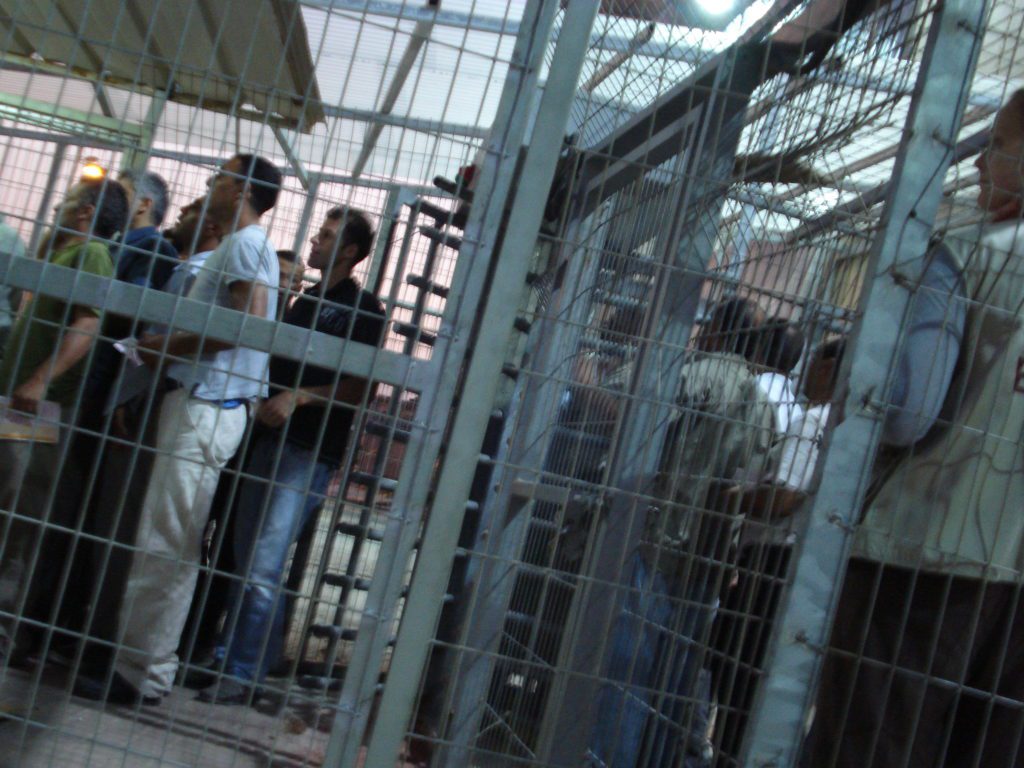

Once again, I felt alarmed, unsafe. After emerging through this labyrinth of security to the Israeli side, we looked around for our bus. It wasn’t there. So we waited. I was getting more and more nervous about the time of my flight with each passing minute. After about 10 minutes, the bus arrived and I narrowly made it to the airport. Upon going through no less than three security checkpoints, I was pulled aside for a thorough search. It was then that I realized how stupid I had been.
Naivete
I had left my bag unattended in the back of a Palestinian vehicle all morning. I should not have been worried about items being taken from my bag, but, rather, items being placed into my bag. No doubt my passport being scanned at the military border of Palestine just two hours previous to my arrival at the Israeli airport was cause for alarm. But, after a very thorough search of my belongings, I was allowed through. However, during the search, I once again felt alarmed, unsafe; mostly because of all the people standing nearby. What if something happened in the airport before the bag was fully examined? What if I was used as a pawn in an attack? Should I have known better? You’d certainly think so from the way our media portrays “these people.” But I hadn’t. I had been so preoccupied with what I thought was a problem (stealing*), that I had missed what was the more probable problem (terrorism).
And, yet, all was fine. All my fear, suspicion, and mistrust was for naught. And I am ashamed to admit how deep that suspicion and mistrust went.
A Missed Opportunity
I spent the morning with a persecuted brother in Christ and the whole time I questioned his integrity. Is he really a Christian, or is he just saying that to build trust? Is he safe? What is that second cell phone for?
Don’t misunderstand, I am all for situational awareness. I also realize that the relationship between Israel and Palestine is fraught with complexities, and I understand that there are genuinely unsafe places in this world. Yet read that list of my feelings again: alarmed, unsafe, fear, suspicion, mistrust. These are not godly characteristics. I have never been around “these people,” I have no reason to treat them as guilty before proven innocent; yet social conditioning as a safe, white, conservative American had created ungodly attitudes towards another individual who shared something with me that transcends all these stereotypes. He is my true brother. My brother in Christ for eternity.
Unfortunately, our churches too often perpetuate this xenophobia when we do not intentionally seek community and fellowship with our family members from every tongue, tribe, and nation (Revelation 7:9). The Church may not be the source of the bias, but it can perpetuate it.
The source is a wicked, evil cycle between hatred and mistrust which causes violence which, in turn, breeds further hate and mistrust. Only Christ — who, by the way, was born in Palestine and walked with “these people” (who was “these people”) — can change hearts so steeped in hatred and mistrust. Indeed He sacrificed Himself to the hate and mistrust in order to do so.
Therefore, as His Church, His Bride we have a responsibility to perpetuate that legacy, and not the legacy of fear, suspicion, and mistrust that we so often subtly hold for those who are “other” than us.
A Foreign Faith
And that leads me to the second internal conflict which this trip caused inside of me. Everything felt foreign. The terms “Americanized Christianity” or even “Westernized Christianity” really sank in on this trip. There were two reasons for this. First, this is the Middle East. This is the birthplace of Christ, and the very seat of Christianity. Yet the culture, the language, the attitudes, the customs, the food, the government, the religion — in short, all of life — is vastly different from what we experience in the West. Second, even Christianity is different. It is predominantly Catholic or some flavor of Eastern Orthodoxy. Icons, incense, and ritual are the norms. I consider myself fairly well-traveled, and I fashion myself Evangelically ecumenical; yet this place and these traditions were wholly other to me.
Memorials and Idols
In Jerusalem, at the Church of the Holy Sepulchre (the site of the crucifixion and the empty tomb), Christians from all over the world were placing specific (very expensive) souvenirs on the marble slab that supposedly held Christ’s body as they wrapped it for burial. By doing that, the trinket becomes a holy relic. Similarly, in the empty tomb and at the star in the church marking Jesus’ birth, people were kneeling (bowing), kissing, and crying over these sites. What could have been a beautiful memorial (very biblical) had become a shrine and idol (very unbiblical). A memorial leads to worship. A shrine or an idol is worshiped. Indeed, one of the most memorable portions of the trip was waiting to go into the cave/stable where Jesus was born. A Greek-Orthodox group began singing. I did not recognize the song at first, but it was beautiful. What’s more, it was directed outward, in worship to God. I know this, because I did eventually recognized the call and response refrain to Kyrie Eleison.
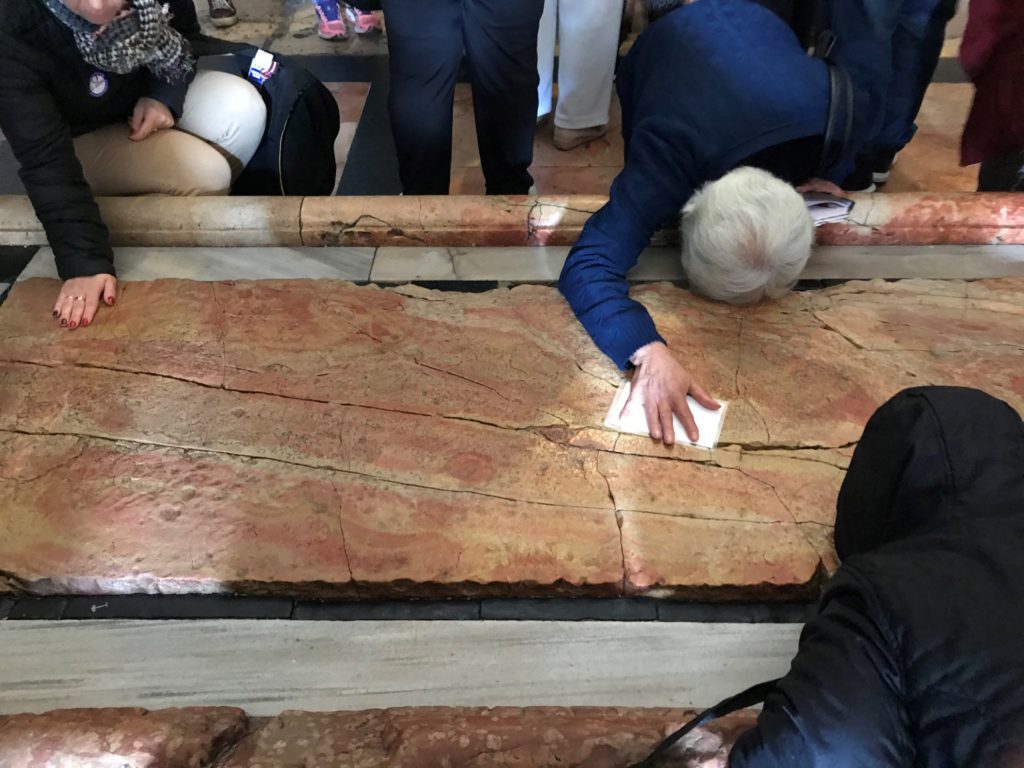
For many tourists, these sites in-and-around-Jerusalem were a highly emotional experience. But at other sites, like the Western (Wailing) Wall, there was a reverent piety forced upon visitors which served as a small taste of the legalism to which the strict Orthodox Jews adhere. All of these sites seemed to hold extremes which make the emotional fervor of Pentecostals, the rituals of the high church denominations, and the legalism of the fundamentalists look like child’s play in comparison.
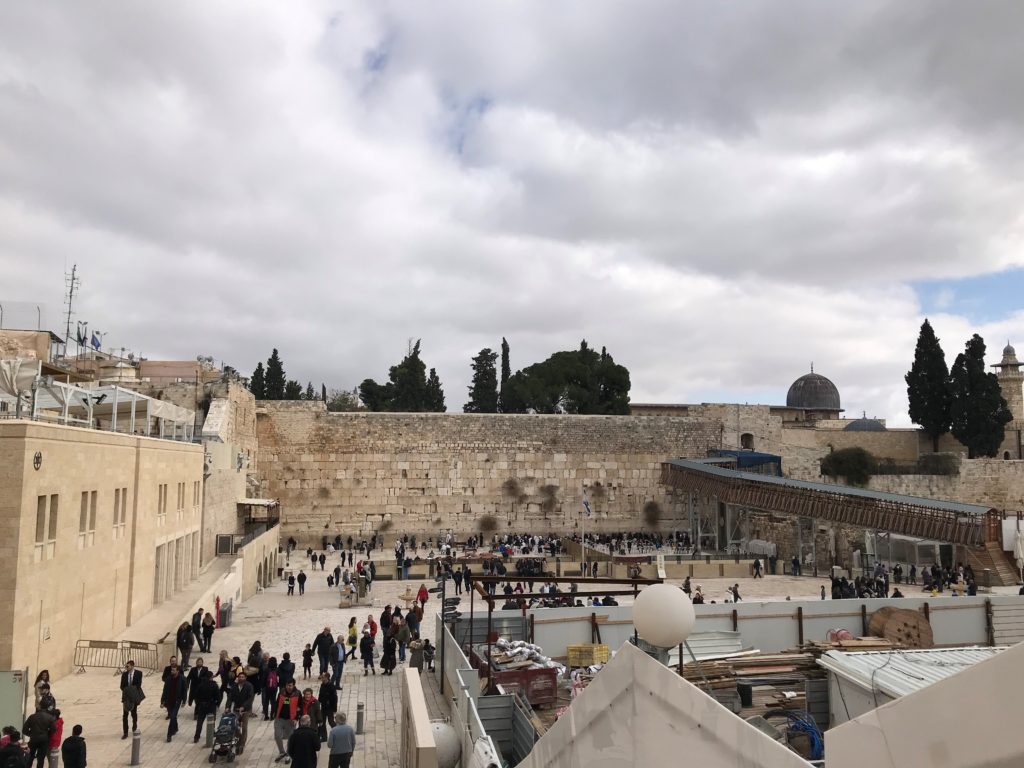
These are the extremes (and everything in-between) into which Christ speaks. Sometimes with love and sometimes with chastisement.
The Foundation and Seat of Our Faith
This cultural and religious otherness is the birthplace and home of Christ. He is the cornerstone. The Church is built upon the foundation of the apostles and prophets (Ephesians 2:20) who were instructed to make disciples of all nations (Matthew 28:19). Indeed, as the Jerusalem Council in the book of Acts made clear, the traditions that were binding in that cultural context were loosened as Christ made His home in the hearts, lives, and, yes, cultures of new peoples – for He, through His word, had created them all. But, although the Jerusalem Council loosened restrictions, they also warned against idolatry and self-righteousness (Acts 15). Both were dangers of religion at that time, and what’s funny is that both remains dangers in Jesus’ homeland and abroad even today.As I stood watching the masses spread their souvenirs across that slab, I couldn’t help but think it was the very sort of table that Jesus would have overturned. May He do that in our hearts and minds today as we confess our lingering religiosity, along with our hatred, mistrust, and general apathy towards our brothers and sisters who are other than us.
*This also was probably due to conditioning over what crimes people in impoverished areas might commit, but I don’t have time to address that issue in this post.
Additional Resources
If you enjoyed this post, you may also enjoy my book on relational theology The Relational God :
Additional Thoughts
This post is one in a group of posts about God and the Church. As I teach, study, or experience certain passages, topics, or events, I find it helpful to coalesce my thoughts into a cogent blog post.
Encouraged?
- Add your comments or questions below
- Share this post using the share-buttons at the top right of this post.
